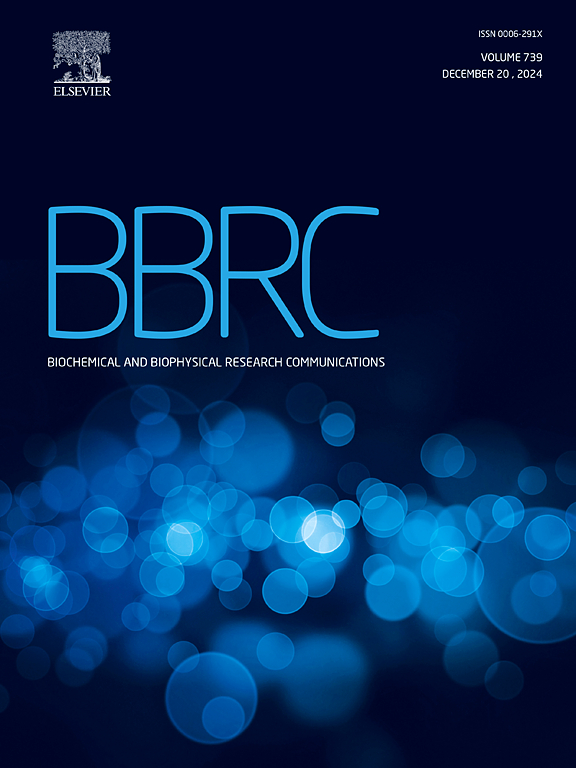雌激素缺乏影响绝经后骨质疏松双阴性T细胞功能,激活NF-κB
IF 2.2
3区 生物学
Q3 BIOCHEMISTRY & MOLECULAR BIOLOGY
Biochemical and biophysical research communications
Pub Date : 2025-06-14
DOI:10.1016/j.bbrc.2025.152212
引用次数: 0
摘要
绝经后骨质疏松症(PMOP)主要由雌激素缺乏引起,其特征是骨吸收过度和免疫稳态破坏。尽管免疫系统对骨质流失的贡献有充分的文献记载,但特定的调节亚群,如双阴性T (DNT)细胞(CD3+TCRαβ+CD4 - CD8 - NK1.1 -)的作用仍不清楚。本研究采用卵巢切除(OVX)小鼠模型,结合转录组学分析、体内功能分析和体外研究来研究DNT细胞的改变。OVX小鼠DNT细胞频率和免疫调节能力均显著降低,并伴有凋亡增加和增殖抑制。RNA测序显示NF-κB信号通路和凋亡通路同时上调,雌激素受体(ER)信号通路和细胞毒性下调。在体外,雌激素刺激增强DNT细胞免疫调节功能和雌激素受体Esr1表达,抑制NF-κB活化。这些结果表明,雌激素缺乏可能通过NF-κB途径激活DNT细胞的活力和功能,从而加剧ppu的免疫失调。我们的研究表明,DNT细胞可能是参与骨免疫学的重要免疫参与者,也是骨质疏松症免疫调节治疗的潜在靶点。本文章由计算机程序翻译,如有差异,请以英文原文为准。
Estrogen deficiency impairs double-negative T cell function and activates NF-κB in postmenopausal osteoporosis
Postmenopausal osteoporosis (PMOP), which is driven primarily by estrogen deficiency, is characterized by excessive bone resorption and disrupted immune homeostasis. Although immune system contributions to bone loss are well-documented, the roles of specific regulatory subsets, such as double-negative T (DNT) cells (CD3+TCRαβ+CD4−CD8−NK1.1−), remain unclear. Herein, by using an ovariectomized (OVX) mouse model of PMOP, we integrated transcriptomic profiling, in vivo functional assays, and in vitro studies to investigate DNT cell alterations. The OVX mice presented significant reductions in both DNT cell frequency and immunoregulatory capacity, which were accompanied by their increased apoptosis and suppressed proliferation. RNA sequencing revealed concurrent upregulation of NF-κB signaling and apoptotic pathways with downregulation of estrogen receptor (ER) signaling and cytotoxicity. In vitro, estrogen stimulation enhanced DNT cell immunoregulatory function and estrogen receptor Esr1 expression, while inhibiting NF-κB activation. These results demonstrated that estrogen deficiency impaired DNT cell viability and function, potentially through NF-κB pathway activation, thereby exacerbating immune dysregulation in PMOP. Our study suggests that DNT cells may represent important immune players involved in osteoimmunology and potential targets for immunomodulatory therapies of osteoporosis.
求助全文
通过发布文献求助,成功后即可免费获取论文全文。
去求助
来源期刊
CiteScore
6.10
自引率
0.00%
发文量
1400
审稿时长
14 days
期刊介绍:
Biochemical and Biophysical Research Communications is the premier international journal devoted to the very rapid dissemination of timely and significant experimental results in diverse fields of biological research. The development of the "Breakthroughs and Views" section brings the minireview format to the journal, and issues often contain collections of special interest manuscripts. BBRC is published weekly (52 issues/year).Research Areas now include: Biochemistry; biophysics; cell biology; developmental biology; immunology
; molecular biology; neurobiology; plant biology and proteomics

 求助内容:
求助内容: 应助结果提醒方式:
应助结果提醒方式:


